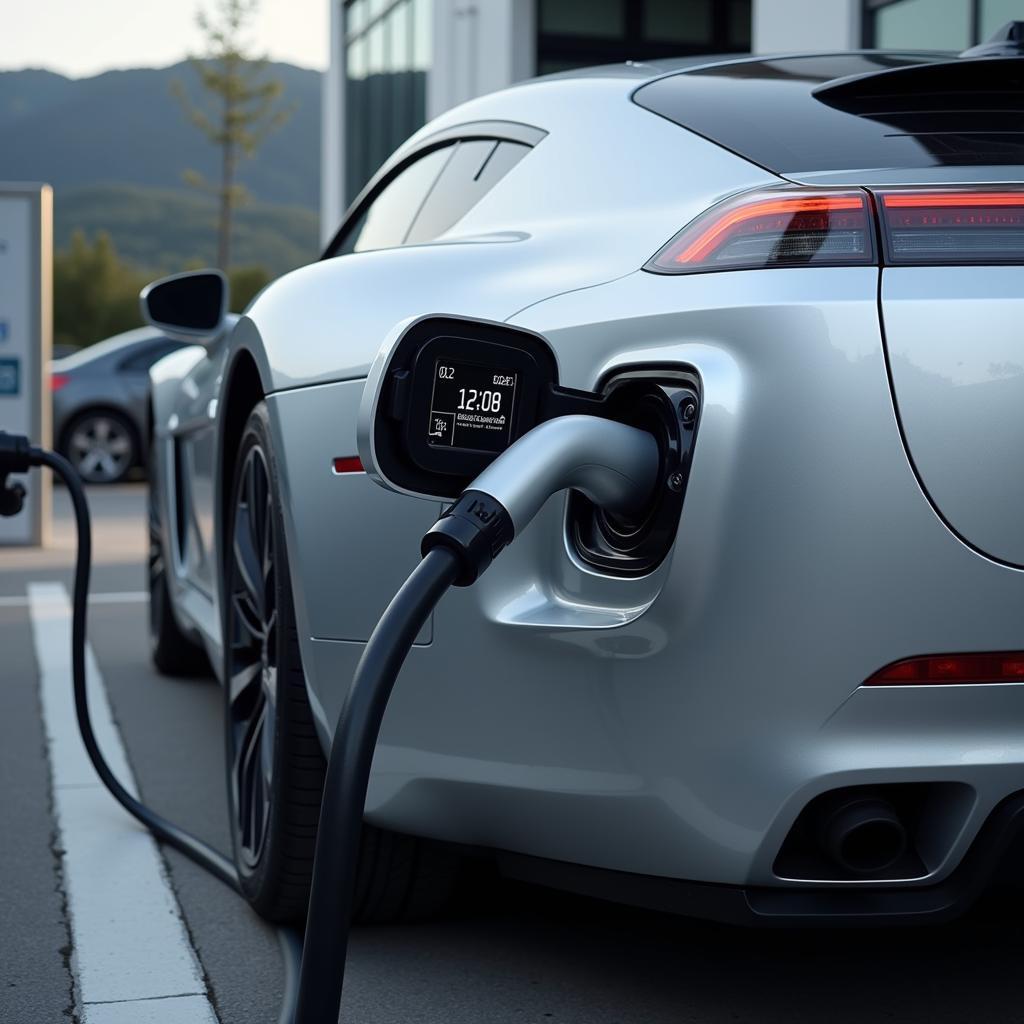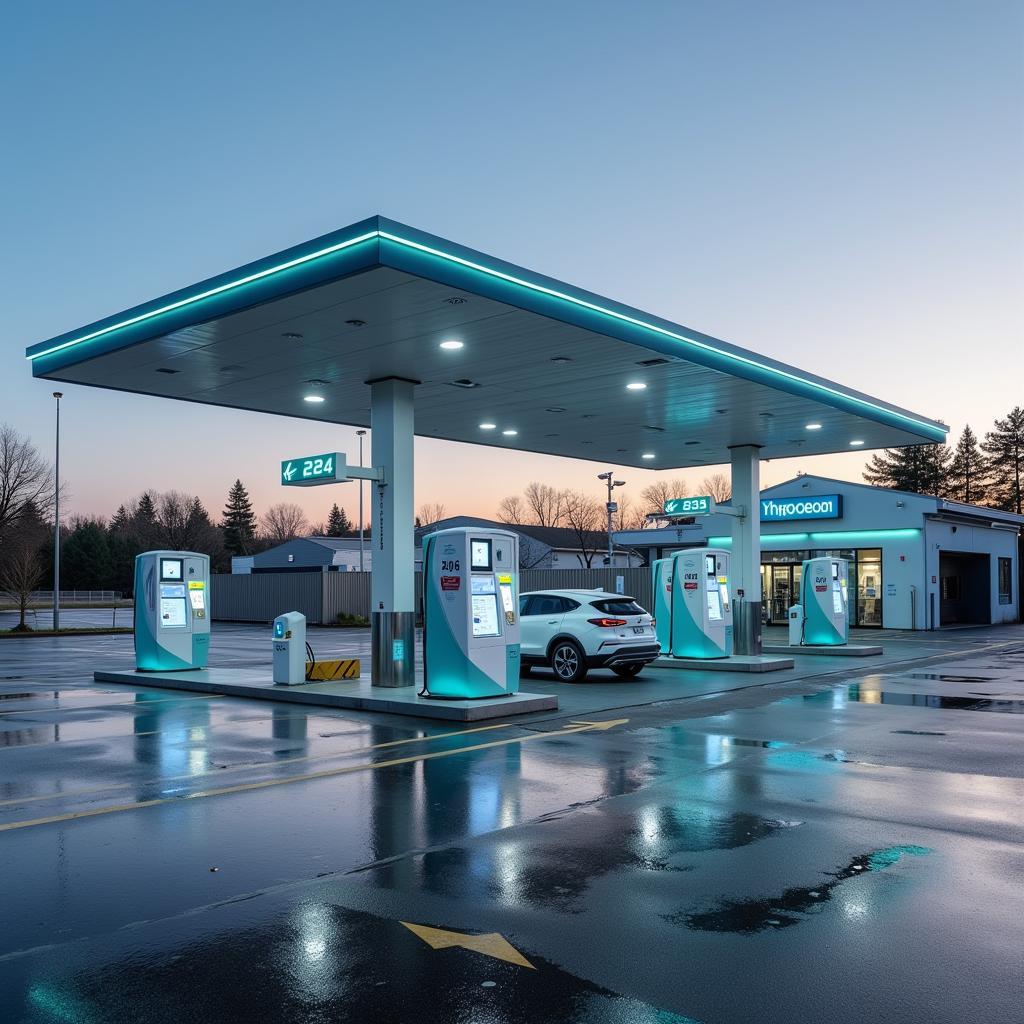Hydrogen fuel cell cars are often touted as the future of clean transportation. They produce zero tailpipe emissions, emitting only water vapor, and offer the potential for long driving ranges and fast refueling times. However, several Problems With Hydrogen Fuel Cell Cars are preventing widespread adoption. This article delves into these challenges, exploring both the technical and infrastructural limitations they present.
 Hydrogen Fuel Cell Car Refueling
Hydrogen Fuel Cell Car Refueling
Hydrogen Storage and Transportation: A Logistical Nightmare
One of the most significant problems with hydrogen fuel cell cars lies in the nature of hydrogen itself. Hydrogen has a very low energy density per unit volume, meaning storing a sufficient amount requires large, bulky tanks. These tanks need to be pressurized to extremely high levels (up to 700 bar) to increase the energy density, which presents safety concerns and adds complexity to the vehicle’s design.
Transporting hydrogen is another hurdle. Because of its low density, moving hydrogen requires specialized cryogenic tankers or pipelines. This transportation infrastructure is currently limited and expensive to develop, making it difficult to distribute hydrogen fuel widely and affordably.
 Hydrogen Fueling Station Infrastructure
Hydrogen Fueling Station Infrastructure
Fuel Cell Durability and Cost: Ongoing Concerns
Fuel cells, the heart of these vehicles, are still relatively expensive to produce. They require platinum as a catalyst, a precious and costly metal. While research is ongoing to find more affordable alternatives, the cost of fuel cells remains a barrier to mass production and consumer affordability.
Furthermore, fuel cells have limited lifespan and are prone to degradation over time. Exposure to impurities in the hydrogen fuel can poison the catalyst, reducing the fuel cell’s efficiency. This degradation necessitates costly replacements, further increasing the total cost of ownership.
Lack of Infrastructure: The Chicken and Egg Dilemma
Perhaps the biggest hurdle for widespread hydrogen fuel cell car adoption is the lack of refueling infrastructure. Building a network of hydrogen fueling stations requires substantial investment. However, without a significant number of hydrogen fuel cell cars on the road, the demand for such infrastructure is low, making it financially unattractive for investors. This classic “chicken and egg” dilemma poses a significant obstacle to the growth of the hydrogen fuel cell car market.
Environmental Concerns: Not Entirely Green
While hydrogen fuel cell cars produce zero tailpipe emissions, the overall environmental impact depends heavily on how the hydrogen fuel is produced. Currently, most hydrogen production relies on fossil fuels, primarily through a process called steam methane reforming. This method releases significant amounts of carbon dioxide, negating the environmental benefits of using hydrogen fuel cell cars.
Switching to green hydrogen production methods, such as electrolysis using renewable energy sources, could mitigate these environmental concerns. However, these methods are currently more expensive and not yet widely deployed.
list of environmental problems associated with electric cars
Competition from Battery Electric Vehicles: A Formidable Challenge
The rise of battery electric vehicles (BEVs) poses another challenge to hydrogen fuel cell cars. BEVs have witnessed significant advancements in recent years, with rapidly improving battery technology, decreasing costs, and a growing charging infrastructure. Compared to hydrogen fuel cell cars, BEVs currently offer a more practical and affordable solution for most consumers.
what is one problem that resulted from gasoline powered cars
The Future of Hydrogen Fuel Cell Cars: Uncertain but Promising
Despite these challenges, hydrogen fuel cell technology holds immense potential. Research and development are ongoing to address the current limitations, such as exploring new materials for fuel cells, improving hydrogen storage technologies, and developing more efficient hydrogen production methods.
“Hydrogen fuel cell technology has the potential to revolutionize the transportation sector, particularly for long-haul trucking and heavy-duty vehicles where battery electric vehicles face range limitations,” says Dr. Emily Carter, a leading researcher in fuel cell technology at Princeton University. “However, overcoming the existing infrastructure and cost barriers is crucial for widespread adoption.”
Conclusion: A Long Road Ahead
Hydrogen fuel cell cars offer a compelling vision for a cleaner transportation future. However, several significant problems, including storage and transportation challenges, high costs, limited infrastructure, and environmental concerns, must be addressed before they can become a mainstream alternative.
Overcoming these hurdles requires sustained investment in research and development, government incentives to promote adoption, and collaboration between automakers and energy companies to build the necessary infrastructure. While the road ahead is long and challenging, the potential benefits of hydrogen fuel cell cars make them a technology worth pursuing.
Need help troubleshooting your car problems? Contact the experts at AutoTipPro at +1 (641) 206-8880 or visit our office located at 500 N St Mary’s St, San Antonio, TX 78205, United States.
FAQs about Hydrogen Fuel Cell Cars
1. How safe are hydrogen fuel cell cars?
Hydrogen fuel tanks are designed with multiple safety features to prevent leaks and withstand impacts. Hydrogen is also lighter than air and dissipates quickly, reducing the risk of fire in case of an accident.
2. How long does it take to refuel a hydrogen fuel cell car?
Refueling a hydrogen fuel cell car takes about 3-5 minutes, similar to gasoline cars.
3. What is the driving range of a hydrogen fuel cell car?
Most hydrogen fuel cell cars offer a driving range of over 300 miles on a single tank.
4. Are hydrogen fuel cell cars more expensive than electric cars?
Currently, hydrogen fuel cell cars are generally more expensive to purchase than battery electric vehicles due to the high cost of fuel cells and limited production volumes.
5. When will hydrogen fuel cell cars be widely available?
While several automakers have pilot programs and limited production models available, widespread availability of hydrogen fuel cell cars is still a few years away, depending on the development of infrastructure and cost reductions.




Leave a Reply